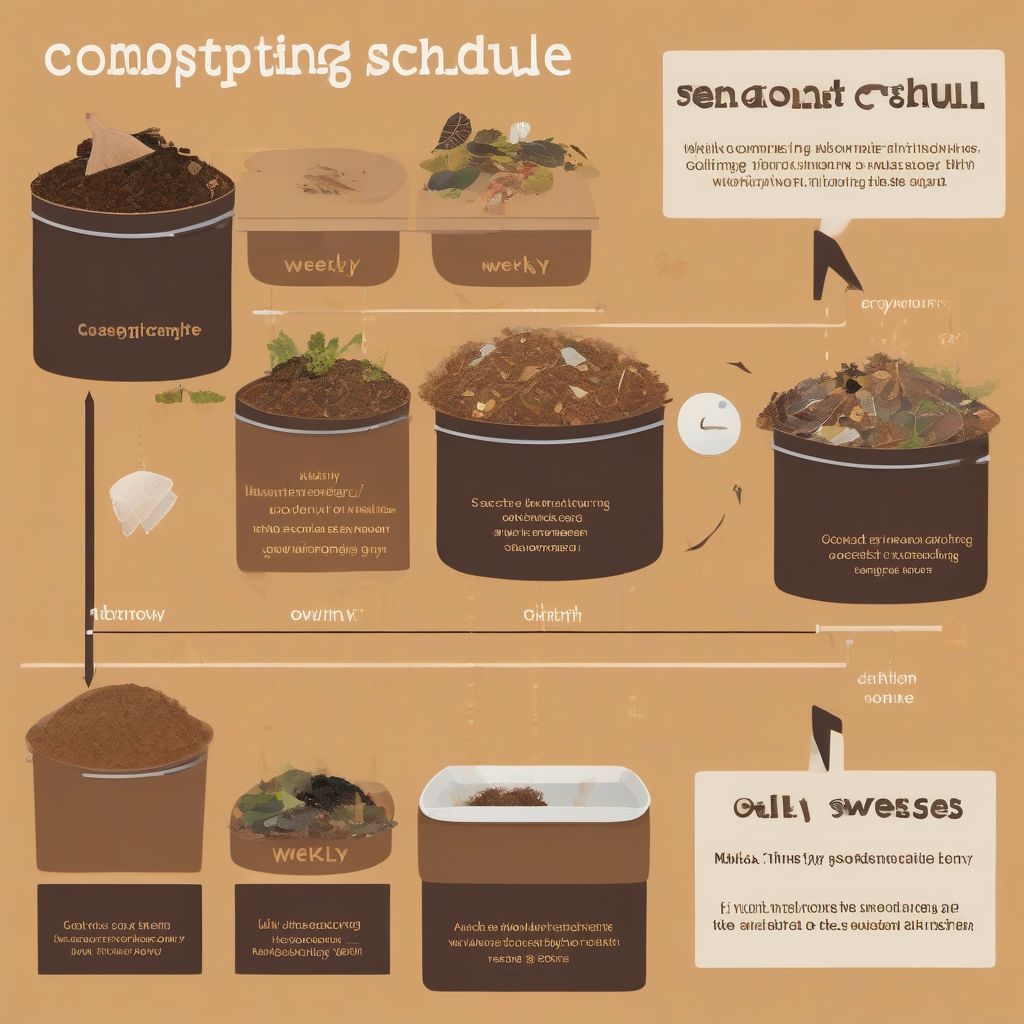Imagine stepping into your garden, greeted by the earthy aroma of nutrient-rich compost, ready to nourish your plants. That dream can be your reality! Composting, a natural process of recycling organic matter, might seem daunting, but I promise, it’s easier than you think. Just like meal prepping simplifies healthy eating, a well-planned composting schedule can turn kitchen scraps into garden gold without the overwhelm.
Understanding the Basics of Composting
Before diving into scheduling, let’s break down the essentials. Composting involves two key players:
Browns: These are your carbon-rich materials, like dried leaves, shredded paper, and cardboard. Think of them as the energy source for your compost microbes.
Greens: These nitrogen-rich ingredients bring the fuel. Think fruit and vegetable scraps, coffee grounds, and grass clippings.
The magic happens when you maintain a good balance of browns to greens, ideally around a 3:1 ratio. This balance, along with air and moisture, creates the perfect environment for microorganisms to break down the organic matter, leaving you with beautiful, crumbly compost.
Factors Influencing Your Composting Schedule
There’s no one-size-fits-all approach to composting schedules. The perfect rhythm depends on a few key factors:
1. Composting Method
Hot composting: This method involves actively managing your compost pile for faster decomposition, often reaching higher temperatures to break down materials within weeks. Hot composting requires more frequent turning and monitoring.
Cold composting: A more hands-off approach where you simply add materials to the pile and let nature run its course. It takes longer, often several months to a year, but demands less maintenance.
2. Season
Just like our eating habits shift with the seasons, so does composting. Warm weather speeds up decomposition, while cold temperatures can slow it down significantly. You might find yourself adding materials more frequently in the summer and less so in the winter.
3. Household Size and Eating Habits
A large family generates more food scraps than a single person. If you’re a vegetarian or fruitarian, your compost will have a higher percentage of “greens” compared to someone who eats a lot of meat (which shouldn’t be composted at home).
Crafting Your Personalized Composting Schedule
Now, let’s translate this knowledge into a practical schedule. Here’s a simple framework:
Weekly:
- Collect Kitchen Scraps: Keep a designated container on your counter for collecting fruit and vegetable peels, coffee grounds, eggshells, and other compostable materials.
- “Turn” Your Compost (Hot Composting Only): Use a pitchfork or compost aerator to mix the pile, ensuring oxygen reaches the center. This step is crucial for maintaining optimal temperatures and speeding up decomposition.
Bi-Weekly or Monthly:
- Add Bulky Browns: Shred cardboard boxes, gather fallen leaves, or collect shredded paper to replenish the carbon source in your compost.
- Check Moisture Levels: Your compost should feel like a damp sponge. Water it lightly if it feels dry or add more browns if it’s too wet.
Seasonally:
- Harvest Your Compost: Depending on your method and climate, you’ll have ready-to-use compost in a few months to a year.
- Protect Your Compost in Winter: Insulate your compost bin with straw or blankets in colder months to keep it active.
 Compost Schedule
Compost Schedule
Tips for a Smooth Composting Journey
- Start Small: Don’t feel pressured to create a huge compost pile overnight. Begin with a small bin and gradually increase the volume as you get the hang of it.
- Location, Location, Location: Choose a well-drained spot for your compost bin or pile that receives a balance of sun and shade.
- Be Patient and Embrace the Process: Composting is a natural process that takes time. Don’t be discouraged if it doesn’t happen overnight. Trust the process, and you’ll be rewarded with nutrient-rich soil.
Composting: A Gift That Keeps on Giving
Creating a composting schedule that aligns with your lifestyle might seem like a small step, but it’s a powerful act of environmental stewardship. By composting, you’re:
- Reducing Landfill Waste: Food waste makes up a significant portion of landfill waste. Composting diverts those scraps, reducing methane gas emissions.
- Enriching Your Garden: Compost acts as a natural fertilizer, improving soil structure, water retention, and providing essential nutrients for plant growth.
- Closing the Loop: Composting embodies the essence of a circular economy – transforming “waste” into a valuable resource that nourishes your garden and the planet.
[amazon bestseller=”compost bin”]
Ready to Turn Your Kitchen Scraps into Garden Gold?
Just like meal prepping empowers you to make healthier food choices, creating a personalized composting schedule can transform your gardening routine and lessen your environmental impact. Start small, stay consistent, and enjoy the rewarding journey of composting!
